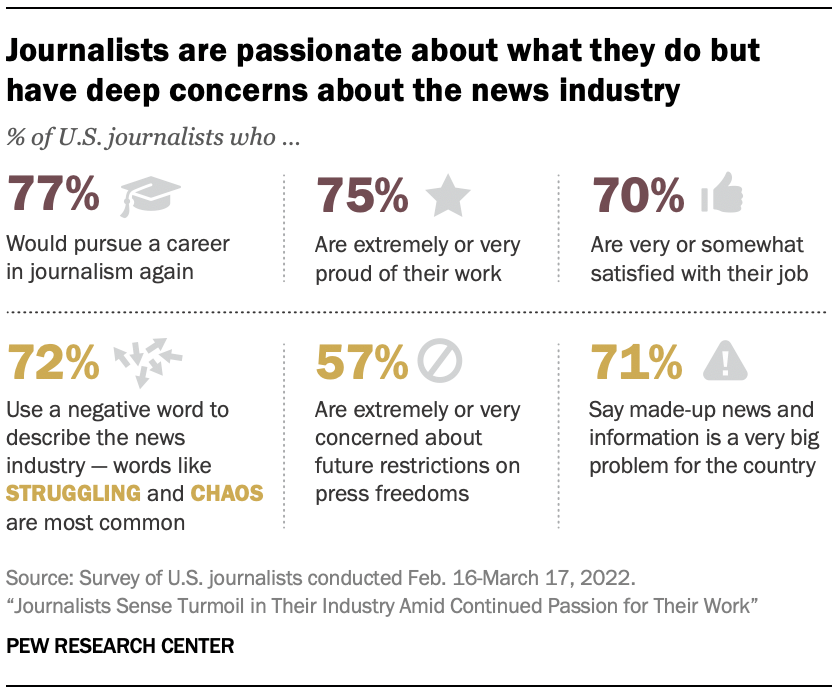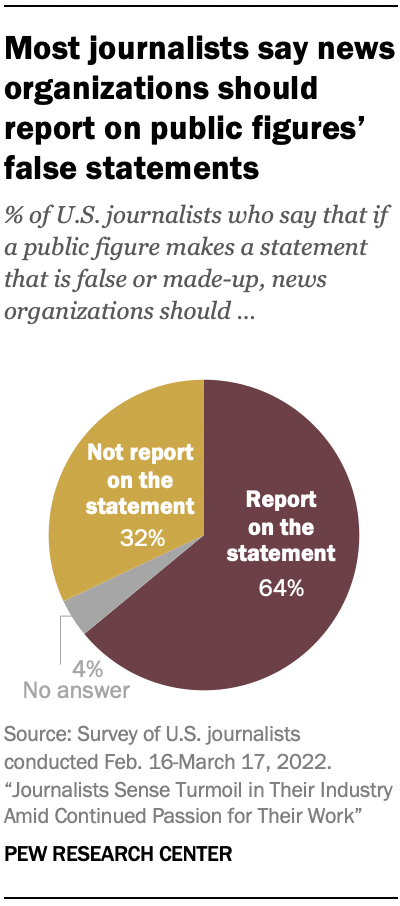77% would choose their career all over again, though 57% are highly concerned about future restrictions on press freedom
, , AND
From the economic upheaval of the digital age to the rise of political polarization and the COVID-19 pandemic, journalism in America has been in a state of turmoil for decades. While U.S. journalists recognize the many challenges facing their industry, they continue to express a high degree of satisfaction and fulfillment in their jobs, according to an extensive new Pew Research Center survey of nearly 12,000 working U.S.-based journalists.

Seven-in-ten journalists surveyed say they are “very” or “somewhat” satisfied with their job, and an identical share say they often feel excited about their work. Even larger majorities say they are either “extremely” or “very” proud of their work – and that if they had to do it all over again, they would still pursue a career in the news industry. About half of journalists say their job has a positive impact on their emotional well-being, higher than the 34% who say it is bad for their emotional well-being.
At the same time, however, journalists recognize serious challenges in the news media more broadly. Indeed, when asked to describe their industry in a single word, nearly three-quarters of journalists surveyed (72%) use a word with negative connotations, with the most common responses being words that relate to “struggling” and “chaos.” Other, far less common negative words include “biased” and “partisan,” as well as “difficult” and “stressful.” (See Chapter 1 for more detailed figures and the methodology for more details about the question asked.)
The survey of 11,889 U.S. journalists, conducted Feb. 16-March 17, 2022, identified several specific areas of concern for journalists, including the future of press freedom, widespread misinformation, political polarization and the impact of social media.
More than half of journalists surveyed (57%) say they are “extremely” or “very” concerned about the prospect of press restrictions being imposed in the United States. And about seven-in-ten journalists (71%) say made-up news and information is a very big problem for the country, higher than the 50% of U.S. adults who say the same. At the same time, four-in-ten journalists say that news organizations are generally doing a bad job managing or correcting misinformation.

A large majority of journalists say they come across misinformation at least sometimes when they are working on a story, and while most say they are confident in their ability to recognize it, about a quarter of reporting journalists (26%) say they have unknowingly reported on a story that was later found to contain false information.
How to report on false statements has become a vexing question for journalists amid a turbulent political climate. The survey asked journalists what they think is the best approach to coverage when a public figure makes a false statement. By two-to-one, journalists are more likely to say the best approach is to “report on the statement because it is important for the public to know about” (64%) rather than to “not report on the statement because it gives attention to the falsehoods and the public figure” (32%).
Seguir leyendo: Pew Research Center


